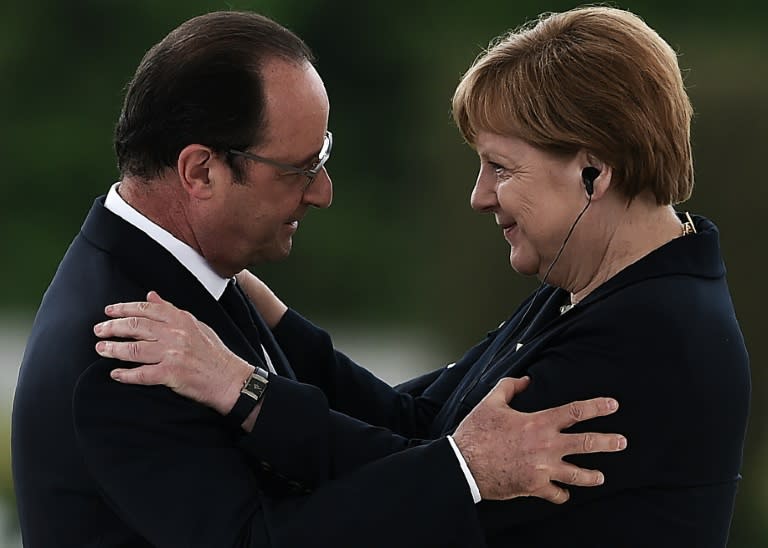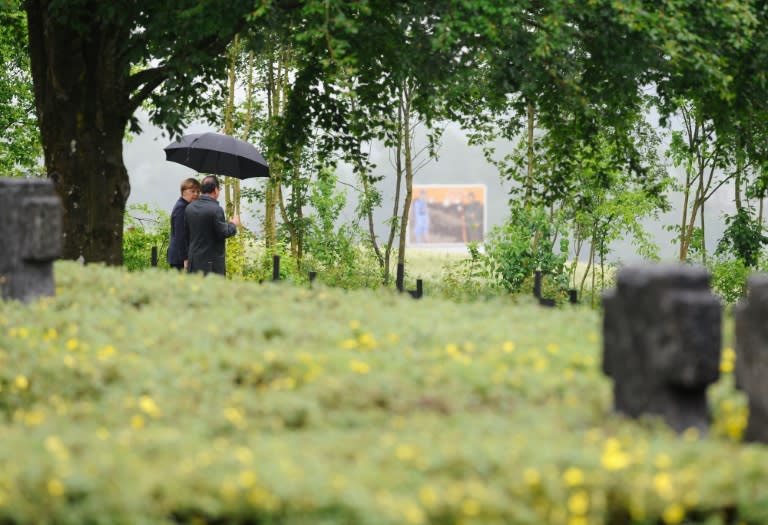Hollande, Merkel call for European unity at Verdun centenary
French President Francois Hollande and German Chancellor Angela Merkel appealed Sunday for Europe to unite to face its current challenges as they marked the 100th anniversary of Verdun, the longest battle of World War I. The 300 days of fighting in northeast France were one of the bloodiest battles of the war, claiming more than 300,000 lives before France emerged victorious. Hollande and Merkel said just as France and Germany had put aside their shared history to become close allies, the European Union must now pull together to deal with the migrant crisis and a possible British exit in a referendum next month. Once again, Europe was in danger of "division and turning in on ourselves", the French president said in a speech before thousands of white crosses at the Douaumont ossuary, where the remains of 130,000 soldiers -- both French and German -- are buried. "Our solemn duty is written in the ravaged ground of Verdun... let's love our own people but let's protect our common home, Europe, without which we would be exposed to the storms of history," Hollande said. Merkel, whose country took in more than one million refugees in 2015, said the challenges of the 21st century "can only be overcome together". The chancellor said "nationalistic thinking and actions will set us back" and that Europe was "fragile" because "weaknesses" had appeared. The lessons for Europe from the "catastrophes" of the 20th century were that "it is essential not to shut ourselves off, but to be open to each other," Merkel said. - 'Europe lost its way' - Under persistent rain, the two leaders began the day of commemoration by laying a wreath at the German military cemetery at Consenvoye, just north of Verdun. Sharing an umbrella, they walked between rows of black crosses inscribed with the names of the German dead stretching down the hill where 11,000 soldiers are buried. By visiting the German cemetery, Hollande and Merkel were following in the footsteps of their predecessors Francois Mitterrand and Helmut Kohl. When Mitterrand and Kohl joined hands there during the playing of the French national anthem in 1984, it underlined how close ties had become between the two countries, former enemies who are now often described as the twin motors of the European Union. In a speech at Verdun town hall, Hollande said: "Verdun is a town which represents both the worst -- where Europe lost its way 100 years ago -- and the best, because the town has been able to galvanise itself and unite for peace and Franco-German friendship." Over lunch, the two leaders discussed the ongoing migrant crisis, which has seen hundreds of thousands of migrants and refugees pouring into Europe in search of a new life. They then attended the main ceremony at Douaumont, where 3,000 French and German schoolchildren took part in a re-enactment choreographed by German filmmaker Volker Schloendorff aimed at showing how peace can grow from ghastly conflict. Earlier, church bells rang out for miles around in memory of the soldiers killed on both sides. The battle of Verdun lasted from February 1916 to December 1916 and was fought along the front line dividing the French and German armies. The last survivor of the battle died in 2008.




